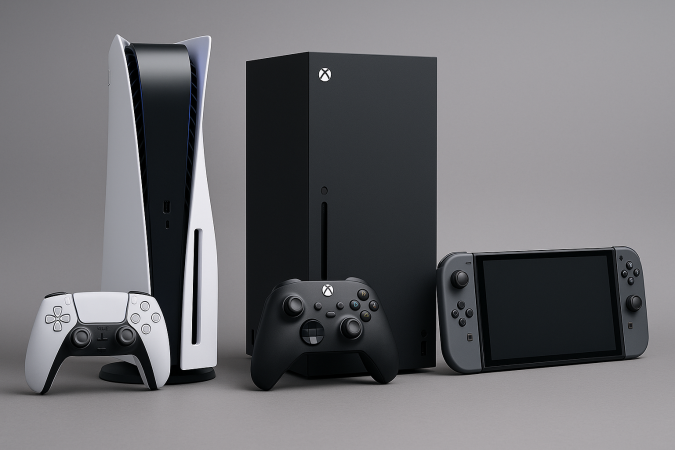No matter what gaming gear you’re after, there’s never been so much choice. Or confusion, for that matter. Every console, controller, and GPU now comes in multiple conditions and price tiers. But another issue most gamers wrestle with is how to buy it.
Are you gunning for brand new from the store, restored from a reputable seller, or used from the street? Each path has its own trade-offs that affect cost, dependability, and how long your setup will last.
Buying New: Maximum Peace of Mind
When you buy something new, you pay for security. With brand-new hardware, parts that haven’t been used, and full maker support, you can just plug it in and play. That means no noise, no movement, and no stress about getting a “refurb sticker.”
You also get the newest software, deals that come in a bundle, and sometimes a launch bonus that is really worth it if you buy early. That edge is worth the extra money for competitive or tech-savvy players.
You pay a lot of money for peace of mind, though. Things that you get as loot in an MMO lose value faster than new tech. The value drops as soon as you open the box. Resale won’t feel good unless you plan to keep your machine for a long time.
As gaming hardware prices rise and restocks stay inconsistent, new ways to acquire consoles have emerged. There are now more unusual, but legal, ways for gamers to get a console than ever before. These include subscription ownership models, verified store lotteries, and trade-in upgrades. Online mystery-box competitions are another example, only users pay a small entry fee for a shot at premium gear.
It’s not a mainstream retail channel, but it’s becoming a noticeable niche. For verified and reputable listings, go to BestCompetitions, for example. Such sites curate some of the best online mystery box competitions, especially in gaming and electronics. They highlight draws that are clear about odds, prizes, and who can enter. This level of accountability is necessary to separate legitimate contests from the countless scams flooding social media.

Refurbished: The Practical Gamer’s Middle Ground
Used tech is the best of both worlds when it comes to price and dependability. Before selling an item, certified sellers test it and fix it, and they usually make it come with a short guarantee. You’ll get gear that works and looks almost brand new for 20–30% less.
That’s not just anecdotal. The market for used electronics is expected to reach about $61.8 billion in 2025 and more than double by 2032, growing at a rate of about 10.2% CAGR per year.
Plus it’s better for the environment. If you buy a used smartphone instead of a new one, you can save about 178 grams (6.29 oz) of electronic waste, which is 89% less waste for that unit. In 2022, the world made about 62 million metric tons of electronic waste, but only 22.3% of it was properly gathered and recycled.
What’s the trade-off? You might not get the newest version, and as stock changes so do Steam sale prices. Still, for most gamers, refurb means high-end speed without going over their credit limit.
Used: The Deal Hunter’s Gamble
The most dangerous and interesting thing about used gear is that it takes you down the craziest paths. You could find a nearly mint PS5 for a lot less than the original price. Or you could take someone else’s overheating problem or worn-out disc drive that breaks in a few months.
Platforms have had problems with being reliable. For example, the first Xbox 360 was known to have a problem called the Red Ring of Death. Some stories claim that more than half of users failed the first time they tried to play.
These numbers don’t exactly match up with current consoles, but they show how problems with mechanics, heat, and drive wear can happen over time.
You can only do what’s right as a buyer because most used gear doesn’t come with a guarantee. Right away, check every port, disc drive, fan noise, Wi-Fi connection, and controller syncing. Plan for fixes or new parts in case something does break.
When you want to go back in time (SNES, PS2, older handhelds) or find rare items that don’t sell new, used routes are the best way to go. For current-gen gear, you’re basically doing risk-reward math. You may save 30–50% off the regular price, but you also take on all the risk of not knowing how reliable the item is.
Comparing the Three Routes
| Option | Price | Risk | Warranty | Availability | Hardware Recency |
| New | Highest | Lowest | Full | Easy | Current |
| Refurbished | Medium | Low–Moderate | Limited | Variable | Slightly older |
| Used | Lowest | High | Rare | Broad | Older |
The main question is how much risk are you willing to take to save money? It might cost more to get a new computer, but it will save you time and stress. With a refurb, you get both savings and organization. Used calls for hard work. Lastly, competitions are fun, but they depend on luck and following the rules.
Smart Buying Checklist
- Check authenticity. Always confirm serial numbers and receipts.
- Demand transparency. Refurbishers should show what was replaced and tested.
- Use secure payments. Stick to platforms offering buyer protection.
- Inspect early. Test within return windows.
- Understand the odds. For competitions, ensure rules, prize pools, and odds are disclosed.
- Think resale. Branded limited editions or official refurbs hold value better than open-box used units.
- Time your purchase. End-of-cycle refreshes or mid-gen upgrades can shift prices sharply.
Conclusion
There’s no one answer that works for everyone. If you must have dependability and peace of mind, you should try something new. If you want high-end performance for less money, pick a refurbished choice that you can trust. For cheap or old-school games, used gear can still be useful.
All this holds water as long as you do your research. Also, competition-based buying is an unusual and exciting option for people who are willing to take measured risks.
The best buy is the one that fits your level of comfort with risk and the length of time you plan to keep your tech. The goal is the same whether you open a new box or win it in a drawing: Play more games and feel less guilt.

